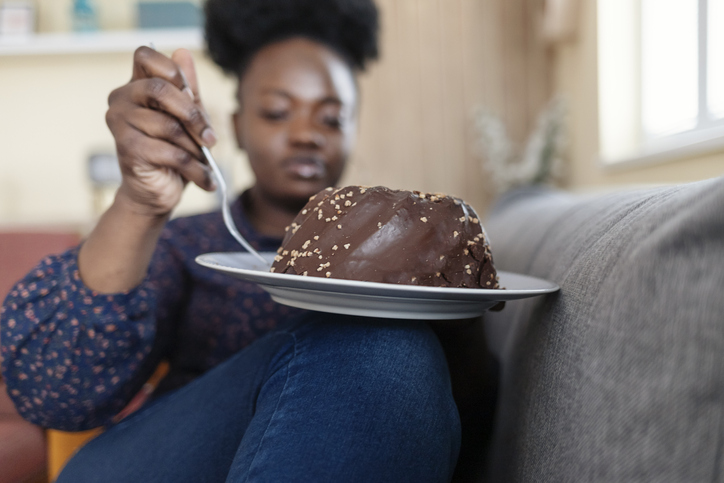
Source: PixelsEffect / Getty
Eating disorders are about way more than food. Eating disorders have the highest mortality rate of any mental illness, according to the National Association of Anorexia Nervosa and Associated Disorders (ANAD). This group of disorders, which includes bulimia nervosa, anorexia nervosa, pica, body dysmorphia, binge eating disorder, rumination disorder and restrictive food intake disorder, is affecting Black women but they aren’t getting the help that they require. The ANAD also pointed out that Black people are less likely to be assessed for eating disorders by doctors and less likely to be diagnosed with one or receive treatment.
When I spoke to Patience Owunwanne, a registered dietitian based in Maryland, she laid out the underlying factors that cause Black women to suffer from this disorder in silence.
One of the reasons Black women aren’t getting the proper diagnosis and treatment is the body stereotype regarding people with eating disorders.
“Sometimes patients don’t identify with the eating disorder because they feel like they don’t look sick enough,” Owunwanne said. “The stereotypes regarding people with eating disorders are being white, very very thin with protruding bones, thinning hair, brittle nails like you see in the movies. But life is not a movie and you don’t have to be 50 pounds to have an eating disorder.”
If a woman of color goes to a doctor complaining of eating disorder symptoms and she doesn’t fit the stereotype, she is more likely to be turned away.
“If you look healthy or curvy and you have these symptoms, a lot of my clients have said that doctors have told them that they are fine and if anything they should lose weight.”
Another issue is that concerns around food aren’t seen as a major problem, an myth that has to be debunked. This coupled with us fulfilling the “strong Black woman” image leads to a serious illness and its symptoms being ignored.
“We minimize our own issues and problems,” Owunwanne continued. “We say to ourselves, ‘there are people starving so why would I be stressing [over food]?’ We minimize our struggles because there’s this idea that we have to be strong.”
Eating disorders are far from a minimal issue. Besides the mortality rates, people with eating disorders suffer from a slew of health issues like amenorrhea, which is the absence of menstruation, kidney failure, irregular heart rhythm, organ failure, diabetes, reproductive issues, hair loss, dry skin, gastro-intestinal problems, brittle bones and much more.
When seeking help at the doctor, they often look at our weight and body mass index (BMI) and use that as an indicator of how healthy we are. Owunwanne explained that this is problematic because the BMI scale is antiquated and doesn’t take race, age, body structure or gender into account. It was created in 1830 by Lambert Adolphe Jacques Quetelet who based his data sample on primarily white European men, according to Medical News Today.
“There is no difference between a woman’s BMI and a man’s BMI so they are using the same scale,” she said. “There are no accommodations for muscle mass to fat ratio, body type or anything like that. It shouldn’t be used to determine anyone’s health.”

Source: Patience Owunwanne / Patience Owunwanne
If you’re seen as overweight and you already have an apparent eating disorder that isn’t being recognized, being told to lose weight can be more hurtful than helpful. Unfortunately this happens frequently to Black women and it is connected to another barrier to getting help: the fat phobia in the medical industry. When patients are engaging in detrimental dieting habits, it may be encouraged by medical professionals and not seen as harmful when it actually is. Owunwanne said she’s even had a client placed on a 500-calorie a day diet by a doctor, which is unrealistic and unhealthy.
“There’s fat phobia in the medical industry too,” Owunwanne continued.” [So they’ll tell a patient] it’s a good thing you’re dieting like this. People are so pro-weight loss that we don’t care about the person’s mental health or if the weight loss is beneficial to them at all.”
Owunwanne said many of her clients have comorbidities and also have been diagnosed with depression, anxiety and other mental illnesses. The eating disorder and mental illness combined lead to the unstable eating habits.
“The eating disorder is usually a symptom or manifestation of a bigger issue,” she said. “If you have depression, your hormones are already out of balance. Some people don’t eat for days when they are depressed and hunger and fullness are regulated by hormones. If you are someone who eats emotionally when you are depressed and you are getting serotonin from having the comfort of eating food then you might overeat because it’s making you feel better. Being depressed is painful so you’re seeking pleasure.”
This needs to be taken into consideration when someone is seeking treatment. Many people often go to their primary care provider with these concerns. Contrary to popular belief, doctors are not extensively trained in nutrition and eating disorders in medical school. It is crucial for people with eating disorders to have an interdisciplinary team that includes a doctor (or psychiatrist), therapist and dietitian that are all trained in treating eating disorders.
For more information on how to reach Owunwanne, who is working virtually, she can be reached at theposhdiet@gmail.com.









